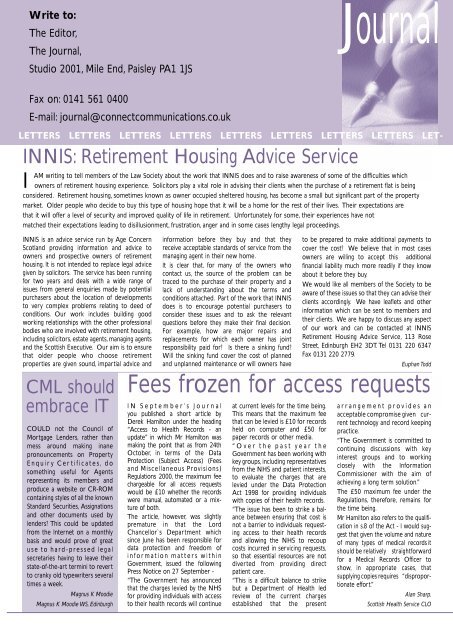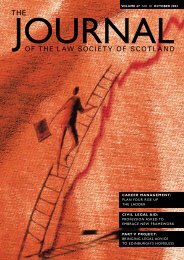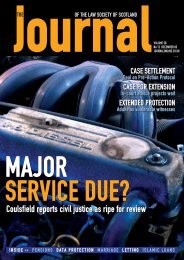OF THE LAW SOCIETY OF SCOTLAND - The Journal Online
OF THE LAW SOCIETY OF SCOTLAND - The Journal Online
OF THE LAW SOCIETY OF SCOTLAND - The Journal Online
Create successful ePaper yourself
Turn your PDF publications into a flip-book with our unique Google optimized e-Paper software.
Write to:<br />
<strong>The</strong> Editor,<br />
<strong>The</strong> <strong>Journal</strong>,<br />
Studio 2001, Mile End, Paisley PA1 1JS<br />
Fax on: 0141 561 0400<br />
E-mail: journal@connectcommunications.co.uk<br />
CML should<br />
embrace IT<br />
<strong>Journal</strong><br />
LETTERS LETTERS LETTERS LETTERS LETTERS LETTERS LETTERS LETTERS LET-<br />
INNIS: Retirement Housing Advice Service<br />
I<br />
AM writing to tell members of the Law Society about the work that INNIS does and to raise awareness of some of the difficulties which<br />
owners of retirement housing experience. Solicitors play a vital role in advising their clients when the purchase of a retirement flat is being<br />
considered. Retirement housing, sometimes known as owner occupied sheltered housing, has become a small but significant part of the property<br />
market. Older people who decide to buy this type of housing hope that it will be a home for the rest of their lives. <strong>The</strong>ir expectations are<br />
that it will offer a level of security and improved quality of life in retirement. Unfortunately for some, their experiences have not<br />
matched their expectations leading to disillusionment, frustration, anger and in some cases lengthy legal proceedings.<br />
INNIS is an advice service run by Age Concern<br />
Scotland providing information and advice to<br />
owners and prospective owners of retirement<br />
housing. It is not intended to replace legal advice<br />
given by solicitors. <strong>The</strong> service has been running<br />
for two years and deals with a wide range of<br />
issues from general enquiries made by potential<br />
purchasers about the location of developments<br />
to very complex problems relating to deed of<br />
conditions. Our work includes building good<br />
working relationships with the other professional<br />
bodies who are involved with retirement housing,<br />
including solicitors, estate agents, managing agents<br />
and the Scottish Executive. Our aim is to ensure<br />
that older people who choose retirement<br />
properties are given sound, impartial advice and<br />
COULD not the Council of<br />
Mortgage Lenders, rather than<br />
mess around making inane<br />
pronouncements on Property<br />
Enquiry Certificates, do<br />
something useful for Agents<br />
representing its members and<br />
produce a website or CR-ROM<br />
containing styles of all the known<br />
Standard Securities, Assignations<br />
and other documents used by<br />
lenders? This could be updated<br />
from the Internet on a monthly<br />
basis and would prove of great<br />
use to hard-pressed legal<br />
secretaries having to leave their<br />
state-of-the-art termini to revert<br />
to cranky old typewriters several<br />
times a week.<br />
Magnus K Moodie<br />
Magnus K Moodie WS, Edinburgh<br />
information before they buy and that they<br />
receive acceptable standards of service from the<br />
managing agent in their new home.<br />
It is clear that, for many of the owners who<br />
contact us, the source of the problem can be<br />
traced to the purchase of their property and a<br />
lack of understanding about the terms and<br />
conditions attached. Part of the work that INNIS<br />
does is to encourage potential purchasers to<br />
consider these issues and to ask the relevant<br />
questions before they make their final decision.<br />
For example, how are major repairs and<br />
replacements for which each owner has joint<br />
responsibility paid for? Is there a sinking fund?<br />
Will the sinking fund cover the cost of planned<br />
and unplanned maintenance or will owners have<br />
Fees frozen for access requests<br />
IN September’s <strong>Journal</strong><br />
you published a short article by<br />
Derek Hamilton under the heading<br />
“Access to Health Records - an<br />
update” in which Mr Hamilton was<br />
making the point that as from 24th<br />
October, in terms of the Data<br />
Protection (Subject Access) (Fees<br />
and Miscellaneous Provisions)<br />
Regulations 2000, the maximum fee<br />
chargeable for all access requests<br />
would be £10 whether the records<br />
were manual, automated or a mixture<br />
of both.<br />
<strong>The</strong> article, however, was slightly<br />
premature in that the Lord<br />
Chancellor`s Department which<br />
since June has been responsible for<br />
data protection and freedom of<br />
information matters within<br />
Government, issued the following<br />
Press Notice on 27 September -<br />
“<strong>The</strong> Government has announced<br />
that the charges levied by the NHS<br />
for providing individuals with access<br />
to their health records will continue<br />
at current levels for the time being.<br />
This means that the maximum fee<br />
that can be levied is £10 for records<br />
held on computer and £50 for<br />
paper records or other media.<br />
“Over the past year the<br />
Government has been working with<br />
key groups, including representatives<br />
from the NHS and patient interests,<br />
to evaluate the charges that are<br />
levied under the Data Protection<br />
Act 1998 for providing individuals<br />
with copies of their health records.<br />
“<strong>The</strong> issue has been to strike a balance<br />
between ensuring that cost is<br />
not a barrier to individuals requesting<br />
access to their health records<br />
and allowing the NHS to recoup<br />
costs incurred in servicing requests,<br />
so that essential resources are not<br />
diverted from providing direct<br />
patient care.<br />
“This is a difficult balance to strike<br />
but a Department of Health led<br />
review of the current charges<br />
established that the present<br />
to be prepared to make additional payments to<br />
cover the cost? We believe that in most cases<br />
owners are willing to accept this additional<br />
financial liability much more readily if they know<br />
about it before they buy.<br />
We would like all members of the Society to be<br />
aware of these issues so that they can advise their<br />
clients accordingly. We have leaflets and other<br />
information which can be sent to members and<br />
their clients. We are happy to discuss any aspect<br />
of our work and can be contacted at INNIS<br />
Retirement Housing Advice Service, 113 Rose<br />
Street, Edinburgh EH2 3DT. Tel 0131 220 6347<br />
Fax 0131 220 2779.<br />
Euphan Todd<br />
arrangement provides an<br />
acceptable compromise given current<br />
technology and record keeping<br />
practice.<br />
“<strong>The</strong> Government is committed to<br />
continuing discussions with key<br />
interest groups and to working<br />
closely with the Information<br />
Commissioner with the aim of<br />
achieving a long term solution.”<br />
<strong>The</strong> £50 maximum fee under the<br />
Regulations, therefore, remains for<br />
the time being.<br />
Mr Hamilton also refers to the qualification<br />
in s.8 of the Act - I would suggest<br />
that given the volume and nature<br />
of many types of medical records it<br />
should be relatively straightforward<br />
for a Medical Records Officer to<br />
show, in appropriate cases, that<br />
supplying copies requires “disproportionate<br />
effort.”<br />
Alan Sharp,<br />
Scottish Health Service CLO










